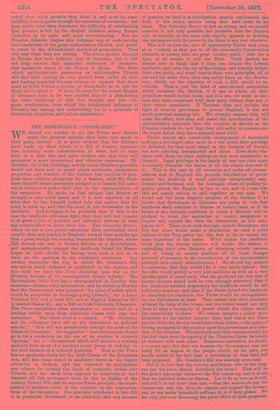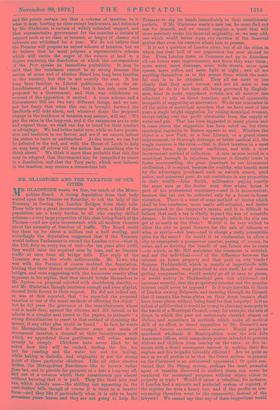THE BIRMINGHAM "PROGRAMME."
WE should not wonder to see the Tories next Session make the greatest mistake they have ever made in their party history. It is quite evident that the Ministry have made up their minds to a Bill of County organisa- tion, including some redistribution of taxes, and to some kind of a land law, and quite evident also that they will encounter a most determined and effective resistance. Mr. Goschen, Sir John Coleridge, and the minor Ministers generally would not have said so much about mortmain, corporation properties, and transfer, if the Cabinet had resolved to post- pone those subjects altogether for a Session, while Mr. Glad- stone himself stands personally pledged to a County Bill under which substantial power shall pass to the representatives of the ratepayers. He spoke on that subject last Session as strongly as man could speak, and it is now reported on all sides that he has himself looked into the matter, that his mind is made up, and that his mind is not favourable to the landlords. And it begins to be probable that if this is the case the landlords will show fight, that they will not consent to so great a loss of position and influence without at least one serious effort to avert their fate. The Saturday Review, which on one or two points represents their sentiments more exactly than any journal in England, warned them months ago that a great change was coming, denounced Mr. Goschen, whose , Bill showed the way to County Reform, as a Revolutionist, and metaphorically slapped the landlords' friend Sir Massey Lopes on both cheeks for having been such a fool as to force on the question by his celebrated resolution. Our readers remember the way in which Mr. Goschen's Bill was not so much defeated as squelched by the squires, and this week we have the Times declaring open war on the Ministry because of its contemplated county reforms. The Birmingham Daily Post has a correspondent in London who sometimes obtains early information, and he stated on Monday that the Government were prepared "for a line of action which would be acceptable to thorough-going Liberals," for a Local Taxation Bill, and a Land Bill, and an English Education Bill to amend Manse 25, and a Bill on Irish University Education. The Times republishes these statements in extenso, and in a leading article upon them positively foams with rage and annoyance. The whole story is a canard. "Mr. Gladstone and his colleagues have not as yet determined on political suicide;" "they will not prematurely outrage the mass of the House of Commons ; " the suggestion "that Government should go in for a revolution on the eve of an election is coarsely vigorous," but a "Government which still musters a working majority little short of a hundred is not prone to indulge in the wild hazards of a defeated gamester." Now as the Times has no particular fancy for the 25th Clause of the Education Act, and has come round to moderate views on the higher education in Ireland, and has endorsed by anticipation any scheme for turning the lands of corporate bodies into Consols, and has never been opposed to simplicity of land transfer, all this excitement must be due to dislike of the coming County Bill, and its one inevitable principle, the super- session of nominee rulers of the counties by the representa- tives of the ratepayers. One provision attributed to this Bill is in particular denounced as an absurdity, and any increase of taxation on land is in anticipation angrily condemned, the drift of the entire article being that land must be let alone. The Saturday Review is just as strong, and we should consider it not only possible, but probable that the Squires will be heartily on the same side, angrily opposed to trusting the ratepayers with the power to tax them in any way whatever.
This will be just the sort of opportunity Tories may jump at to "rebind, as they put it, all the necessarily Conservative elements of society into one great country party," able for a time, at all events, to rule the State. Their leaders are almost sure to think that if they can detach the Liberal landlords, and raise the cry of Revolution, and heartily delight their own party, and stand true to their own principles, all at one and the same time, they may safely force on the dissolu- tion, which, on the rejection of such a Bill, would be in- evitable. That is just the kind of semi-shrewd calculation which enchants the Carlton, it is one to which all their prejudices would incline them, and it is one, we must in fair- ness add, more consistent with their party history than any of their recent expedients. If Toryism does not include the right of country gentlemen to govern England, it has not much practical meaning left. We strongly suspect they will make the effort, that they will resist the introduction of the representative principle into the counties as fiercely as the Prussian Junkers do, and that they will, suffer in consequence the worst defeat they have endured since 1832.
Under almost any conceivable arrangement of household suffrage a privileged class must in a war about their privilege be defeated, for they must stand, as the Junkers of Prussia are now standing, unsupported and alone. Even those who agree with them on other matters on this must necessarily be languid. Legal privilege in the hands of any one class must necessarily diminish the status of all the classes deprived of it. This is the case in all countries and under all circum- stances, and in England the peculiar distribution of power makes the abolition of rural privilege exceptionally easy. Ireland and Scotland and the boroughs when all pulling to- gether govern the Empire by two to one, and in a case like this are nearly certain to pull together as one man. We would ask the most hopeful member of the Carlton if he thinks that Scotehmen or Irishmen are going to vote that landlords shall continue to dispose of county rates, or if he knows of any borough anywhere in which a Member will be pledged to resist the aspiration of county ratepayers to impose and expend the rates for themselves, as city rate- payers do ? There is no such borough outside Shoreham, and this fact alone would make a dissolution on such a point ruinous to the Tory party, but the fact is by no means the most important of the series. What makes the landlords think that the county electors will dislike the chance of controlling their own finances, of obtaining county careers, and of rising to county position, all of them changes involved of necessity in the introduction of the representative principle into county administration ? We should say, subject to correction, that they wouldl,ke it very much indeed ; that the offer would gratify a very just ambition as well as a very ignoble spirit of social envy, that the good and the bad side of county electors would both be very strongly attracted, that if the landlords resisted desperately the landlords would be left politically nowhere, and that if the Tories joined the landlords or absorbed the landlords, the Tories would be extinguished, for one Parliament at least. They cannot seat their nominees without the help of the voters, and the voters would not help them to keep a monopoly of power which the voters would like exceedingly to share. We cannot imagine a policy more disastrous for the landed interest than that which the Times and the Saturday Review would have them follow,--the policy of forcing an appeal to the country upon the government and taxa- tion of the counties. The landlords and their tenants would, for the first time since the passing of the Chanties Clause, be totally at variance with each other. Resistance succeeded, no doubt, two years ago; but that was because the Government was not ready for an appeal to the people, which, on its part, was hardly awake to the fact that a revolution of that kind had been proposed. Mr. Goschen's Bill was scarcely even read.
But it is just that the country gentlemen, who in the long- run pay the rates, should distribute the rates ? That will be the grand argument whenever the Bill comes up, but it is not that we just now desire to discuss. Let it be as true as it will, and still it is not truer than this,—that the well-to-do pay the income-tax and the ill-to-do impose and expend the income- tax, or can under household suffrage do it if they please. We are only just now discussing the party effect of such proposals,
and the points certain are that a echeme of taxation, be it what it may, hurting no class except landowners, and defended by Mr. Gladstone, is certain of widely extended support, and that representative government for the counties is certain of support such as no class, or interest, or league of classes and interests can withstand for a year. We do not believe that the Premier will propose an unjust scheme of taxation, but we do believe that he must propose a representative scheme which will excite the anger of the owners of land to a degree rendering the dissolution of which the correspondent )f the Post speaks an immediate probability. It may be said that the resistance cannot be so strong because the notion of some sort of elective Board has long been familiar to the country, but this is not exactly the case. It has long been familiar to Liberal politicians, just as the en- franchisement of the land has ; but it has only once been proposed by a Government, and then was withdrawn on account of the opposition it excited. A mere scheme and a Government Bill are two very different things, and we can- not but fancy that when this one is brought forward the landlords will take alarm, and whatever shape the proposed change in the incidence of taxation may assume, will say, "We pay the rates in the long-run, and if the ratepayers are to vote and expend them, we shall one day be taxed for their comfort or advantage. We had better resist now, while we have posses- sion and tradition in our favour, and see if we cannot induce the nation to leave us undisturbed. At the worst, we can but be defeated in the end, and with the House of Lords to help us, may keep off reform till the nation has something else to think about." We think it more than probable that this line may be adopted, that Government may be compelled to resort to a dissolution, and that the Tory party, which now believes in the reaction, may receive a tremendous fall.



































 Previous page
Previous page